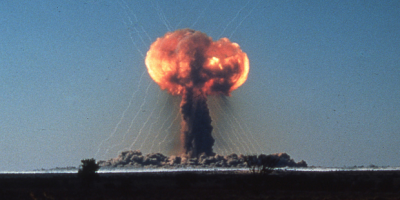International Laws Governing the Use of Nuclear Weapons in Outer Space Expiring in 2021
What's next for the 8 countries (Pakistan, Russia, China, US, France, UK, North Korea, India) with nuclear capabilities

In recent rhetoric about a treaty between Russia and Pakistan to not be the first to deploy weapons in space, citing “The use of force against space-based objects, the development and deployment of Anti Ballistic Missile systems and their integration into space assets have added worrying dimensions to the issues relating to Outer Space” the two countries voiced concerns about International Law allowing control of space and space assets.
Which is exactly what the Trump Space force intends to do, as explained in an excerpt from The United States Space Force, AMI special issue (Vol. 18 N.66), which states their directive,
“Currently, outer space is protected under International Law…..By 2020, new national laws will be in place to manage the governance, services and support the functions of the space force. Where they conflict with international codes, the latter will have to be modified to adjust to new realities.”
There are currently five agreements from as far back as 1967 (Treaty for the prevention of Outer Space) thru the United Nations Office of Outer Space Affairs, due to expire as soon 2021. With 8 current nuclear-powered countries posturing for global economic alliances and control over space-based assets and, the creation of new international laws will be the cornerstone that shapes the future of civilization.
Currently, thirteen countries already have capability to launch into space and leaders like China, Russia, India, Japan, and US are expanding space exploration and manufacturing at an unprecedented rate.
With the escalation of trade tensions, bilateral agreements and pacific-asia trade alliances the topic at the G20 summit, countries like India and the US have directed their officials to meet and resolve trade disputes between the two countries. Russia’s nuclear weapon stockpile now exceeds the US and China is aggressively developing its next generation of nuclear weapons, conducting an average of five tests a month to simulate nuclear blasts, as stated in the South China Morning Post.
In Vienna Austria, plans are underway for World Space Forum 2019 where new International Laws concerning space will likely headline the various discussions such as this one.
“The various factors of access to space, space technology data and facilities, and the importance of joining a global effort in the development of the entire space arena for the benefit of humanity“, is the title for one of the many meetings taking place under the umbrella “Space-4 All” co organized by the European Space Agency and The United Nations Office for Outer Space Affairs (UNOOSA). In addition to the eight nuclear armed countries, NATO member nuclear weapons sharing states include (Belgium, Germany, Italy, the Netherlands, Turkey), with Australia the next likely nuclear armed country to join in, as reported recently by the Bangcock Post.
In the meantime, a Treaty to Ban Space-Based Weapons developed and previously ratified by China and Russia back in the 1970s already exists and could set the stage for International Cooperation in space says Peace in Space activist, Dr. Carol Rosin.
“This treaty could be a milestone of diplomacy for us to end the war mentality and evolve into a peaceful, sovereign space-faring society.” Because, she adds “Once we get to space, we all Earthlings.”
*
Note to readers: please click the share buttons above or below. Forward this article to your email lists. Crosspost on your blog site, internet forums. etc.
D.A. West has a Masters in International Business from DePaul University in the US. She works as an editor and writer, currently living in Tokyo, Japan. Her background is in advances in nanoscience, astrophysics, everything “Space-related” and the implications to an evolving society.

